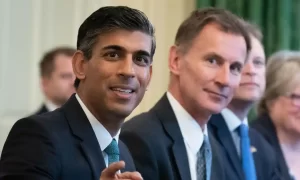Hunt considers further national insurance cut to boost Sunak popularity
The government is considering handing workers another tax cut with a further reduction in national insurance, amid desperate attempts to move on from a campaign to destabilise Rishi Sunak by the Tory right. Read more: Hunt considers further national insurance cut to boost Sunak popularity


The government is considering handing workers another tax cut with a further reduction in national insurance, amid desperate attempts to move on from a campaign to destabilise Rishi Sunak by the Tory right.
With frustration within the cabinet that the Conservative party has been unable to free itself from internal warring over Sunak’s immigration plans and leadership, the prime minister and his chancellor, Jeremy Hunt, are focusing on the tax cuts that will frame their election pitch.
Treasury officials are already exploring options for tax cuts in March’s budget, one of the few setpiece events capable of closing Labour’s stubbornly large poll lead. It is understood that Hunt is again keen to focus tax cuts on “rewarding work and growing the economy”, a priority that led him to cut national insurance from 12% to 10% in last year’s autumn statement. The move saved the average worker £450 a year, but cost about £9bn a year to deliver.
Budget preparations will step up a gear on Tuesday, when the chancellor receives initial economic projections from the Office for Budget Responsibility (OBR). That will give his team a sense of giveaways they can afford.
Government figures pointed to a further cut to employee national insurance and Hunt is said to see national insurance as a “jobs tax” that could be holding back growth.
“National insurance is the top pick,” said one insider. “You can do it immediately. Second, it excludes pensioners, who are already protected thanks to the state pension triple lock [which protects its value]. Third, it goes to those that are working, so it fits our narrative.”
Hunt is also considering an extension of child benefit to wealthier families. Currently, child benefit begins to be withdrawn from those who earn £50,000 a year. People who earn £60,000 a year lose it entirely. The move could stabilise the party in so-called “blue wall” seats – liberal, pro-Remain areas where they are under threat from the Lib Dems and Labour.
The budget has taken on even more significance since the former cabinet minister Sir Simon Clarke broke cover last week to warn his party would face a “massacre” on polling day unless it replaced Sunak. While Clarke struck an isolated figure following his intervention, Sunak’s detractors are planning to use what are likely to be poor byelection results next month to further derail him.
While Clarke’s attempted putsch earned widespread scorn from fellow MPs, there is nervousness among Sunak’s allies and frustration that infighting continues to choke off any recovery in public support for the party. The latest Opinium poll for the Observer shows that Labour continues to enjoy a strong lead. Labour has 42% of the vote, with the Tories on 27% and the Lib Dems and Reform level on 10% each.
Such is the frustration that some of Sunak’s allies want him to be ruthless and remove the whip from Clarke and others who attempt to destabilise the party just months from the election. “We should just take the whip off them,” said one. “Because that would be the strongest signal that if you do this, you’re out. Labour has done this all the time. Once you start doing that, people will know that they haven’t got a chance to come back. That will be it.”
Another said that removing the whip from the rebels was “not in Rishi’s character”, but that the most vociferous critics had been warned they were “getting very, very close” to having the whip removed. “Those who voted against the government [on its Rwanda plan] are in the last chance saloon,” said a senior Tory.
Others want Hunt to tighten the government’s fiscal rules, in a move designed to push scrutiny on Labour’s commitment to eventually invest £28bn in its green plans. The commitment is seen as the largest hostage to fortune remaining in Labour’s programme. However, it is understood Hunt has rejected any plan to alter the rules again before the election.
While the Clarke intervention misfired, there are concerns that there will be an attritional campaign against Sunak. One veteran MP said it was being waged by a small group of disaffected figures on the right who have “a pathological hatred of the Tory party, other than the one led by Boris Johnson”.
Sunak allies have been trying to unmask the donors who funded the mysterious Conservative Britain Alliance, which commissioned a mega poll earlier this month that pointed to a Labour landslide. The poll was used by Lord Frost, the pro-Johnson former Brexit minister, to argue that the party must shift to the right.
There is also an expectation that the Conservatives will lose both byelections in Kingswood and Wellingborough, the latter previously regarded as a safe seat. Even after the budget in March, Sunak will have to endure local elections soon after that are also likely to deliver a bruising result.
Read more:
Hunt considers further national insurance cut to boost Sunak popularity






















